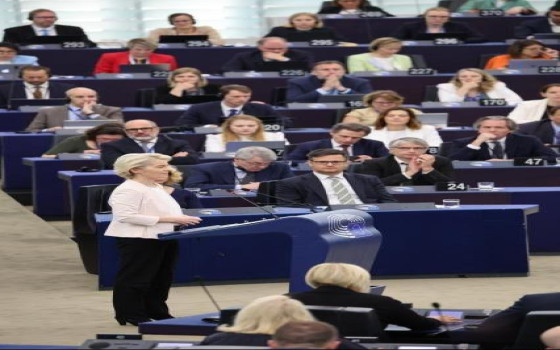
European Commission President Ursula von der Leyen faces no-confidence motions again over a trade agreement with the United States and her stance on the war of genocide in Gaza.

- Europe and Arabs
- Monday , 6 October 2025 9:6 AM GMT
Brussels: Europe and the Arabs
For the second time in less than three months, Ursula von der Leyen returns to the European Parliament to defend herself against no-confidence motions submitted by opposition MPs who accuse her of a range of shortcomings, from a lack of transparency to her failure to negotiate a transatlantic trade agreement.
According to Playbook magazine, the European version of the American magazine Politika, "The events will kick off at 5:00 PM Brussels time with a speech by Jordan Bardella, president of Patriots for Europe, who is expected to strongly criticize von der Leyen for her trade policy, specifically the EU's Mercosur trade agreement and the EU-US trade agreement signed by the Commission in August.
This will be followed by a statement by Manon Aubry, a member of the Left, who, in addition to criticizing trade policy, will accuse von der Leyen of "complicity in genocide" in Gaza, based on comments she made before today's session. Von der Leyen will then have the opportunity to respond to her critics before the leaders of the main political blocs in Parliament deliver their speeches.
Von der Leyen will again rely on her numerical strength, bringing all members of the College of Commissioners alongside her to respond to the speeches by Bardella and the Left, each of whom will submit separate motions of censure.
There will be no vote on the motions today. That's Thursday, and both motions are expected to be rejected outright, as the parties in von der Leyen's coalition—the European People's Party (EPP), the Socialists and Democrats (S&D), and the Renew Europe Movement—as well as the Greens, have rallied behind the German politician.
Regarding the significance of what's happening, Blaibook said, "Although the chances of the two motions passing are slim, they show the Commission president facing increasingly emboldened opposition, not only from the far right and left, but also from members of her own centrist coalition.
Von der Leyen is undoubtedly a more experienced politician than she was when she first took power in Brussels in 2019. She deftly fended off accusers and critics alike during live television debates, as well as during the first no-confidence motion in July, demonstrating that the "Queen of Europe" is capable of confronting her critics and exchanging barbs." But the problems she faces are... 1) These no-confidence motions have become almost routine as lawmakers realize how easy it is to muster 72 votes out of 720 seats in their favor; and 2) criticism of von der Leyen no longer comes only from fringe politicians who have little chance of doing real political damage. Von der Leyen's allies in parliament are now targeting the Commission president, write Max Grera and Gerardo Fortuna in their article in Playbook magazine. Even if the centrist parties don't support them, today's no-confidence motions set the stage for disputes between von der Leyen's coalition partners over key aspects of her legacy, including trade and the Commission's first "simplification" package aimed at removing bureaucracy. In a sign of trouble ahead, the parliament's two largest political groups have signaled their willingness to veto the proposed long-term EU budget. "There are many other votes coming that will test her leadership," said an EPP MEP, who was granted anonymity to speak candidly about the party's most senior figure in Brussels. As Playbook reported last week, the Socialists and Democrats are not ruling out using the censure card "if we see the need," according to a party spokesperson. Speaking to Playbook, former Commission Vice President Thierry Breton argued: "We have a very weak European Commission." It's the first time in a long time that the Commission has faced so many no-confidence votes. You can't say this is bad luck."
Breton, who was originally scheduled to serve a second term on the Commission, left his post last year amid a public rift with his boss, von der Leyen. In his comments on the Playbook website, he portrayed himself as a "friend of the Commission" and stopped short of criticizing von der Leyen personally. But he lamented what he called the "increasing weakness" in the Commission, which "opens space for extremism" to "exploit." He said the problem lies with leadership—and what he sees as a lack of it coming from Berlaymont. "We are in a difficult existential moment where the forces around us are hostile to the European project, whether it's Vladimir Putin in the East or even, I'm sorry to say, but also the United States."
Focusing on the European People's Party's problems, he said it was particularly worrying that the Commission did not have the full support of its president's party—"which is supposed to be its main supporter"—on the EU's long-term budget.












No Comments Found